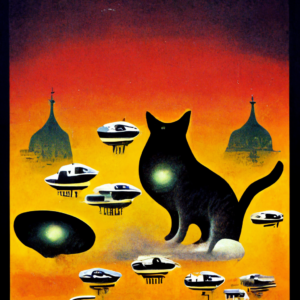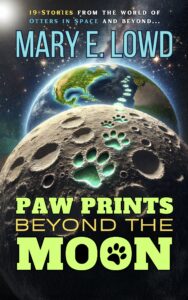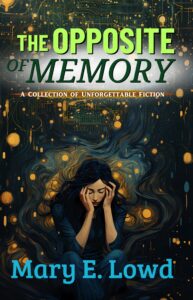by Mary E. Lowd
Originally published in Daily Science Fiction, December 2021; recipient of the Ursa Major Award for Best Short Fiction

Does it matter what your last thoughts are when you die? If you could choose them — they would be hope, wouldn’t they? A bright future. Waiting. Ready. And you’re going to miss it, but wouldn’t you rather die looking out on a shining expanse of golden sunlight, reflecting off ocean waves and filtering through leafy forests? Cities full of smiling people, whiskers turned up in happiness. Bare paws dancing on the concrete streets, and long tails tied together, turned like skipping ropes as adults, filled with laughter, act like mere kits.
Voices rising together in song, drowning out the whistling breeze but also joining with it, becoming part of the natural world again.
My grandmother died ten years ago when the cats invaded our world, landing their flying saucers on top of our cities, crushing our skyscrapers, and then chasing our people like we were nothing more than animated rag dolls. Entertainment to be toyed with, played with, and maybe eaten. Or maybe left to decay — bones and rotting meat, not good enough even to fill a cat’s belly.
We thought they’d never leave. We thought we could never make them.
She was already an old mouse. I take comfort from that. But she died from a broken heart. We lived in a small enough town that the flying saucers didn’t land here. We heard the news, reading it every morning, hearing it every afternoon over the airwaves. All the mice who died. All the mice who suffered. The cats’ were decades ahead of us in technology, that was clear from their flying saucers alone. What chance did we have?
I think my grandmother could have lived longer if they hadn’t come. I don’t know. Maybe not much longer. But from the way she wrung her tail in her paws as she writhed on her deathbed, how low her round ears flattened against her head, and the furious speed of her twitching nose during her death throes — I know. It was the despair, the terror, and the heartbreaking disappointment of what was happening to our world — what our peaceful, hopeful civilization had become — that pushed her over.
I stayed beside her, put my paw on her shoulder, whispering to her all night long through her fevered nightmares, promising her that we’d defeat the cats. When that didn’t work — didn’t give her the peace she needed to relax, let go, and die — I switched to lies. I told her the cats had never come. They were only figments in her nightmares — gold and green eyes, gleaming and glaring, scheming and planning, sizing us up and finding us too small to care about. They weren’t real. Never had been.
Finally, my words sank through her addled dementia. She found peace. Or maybe that’s just a lie I tell myself. Either way, she slept, and she stayed asleep until she was gone.
The lies I told her haunted me for years as I fought in the rebellion, striving to keep the promises I’d made before resorting to lies.
Lies felt like they swirled around me. Lies about how we were better off with the cats ruling us — keeping our population under control. Lies about how they didn’t eat our babies as delicacies, storing them in cages until they were ready to be cooked. Lies about how the advances in technology they brought to us were a fair trade for the lives they took.
And yet, here I am in a rooftop garden, on a rebuilt skyscraper, ready to place a neural helmet, adapted from their technologies on my own head. I see the mice around me, uncertain and scared, barely believing that the cats are finally gone, let alone that we’ve found a way to use the particle blasters they used against us — reversing the effects — to call back the ghosts of our lost loved ones from the years of war.
We can’t really bring them back. Not corporeally. Not permanently. But as I place the helmet on my head, I hear a hum, feel a buzz, and from my memories, it recognizes my grandmother, and the reversed particle blaster draws the final moments of my grandmother’s life back, gathering up the particles that gave her consciousness from wherever they’ve wandered over the years, and casting them into a wispy form in front of me.
I reach out, wishing I could touch her, hold her wrinkled paw. Lay my own paw against the white fur on her muzzle, white with age. Her fur was a glossy chestnut brown in pictures I’ve seen from before I was born. I never knew her that way.
“Grandma?” I say to the ghost in front of me, summoned by science, held together for these few moments by my need and hope.
She looks at the sky, but then she hears me. Recognition sparks in her eyes. “The saucers…” she begins to ask.
“They’re gone, Grandma,” I say. “It’s been years, but we fought. And we organized. And we fought. And we won.”
“The cats are gone?” she asks. If she were corporeal, tears would wet her fur. Instead, her eyes sparkle with emotion — sadness, happiness, I don’t know. Just so much emotion. And there isn’t time for her to share it. There are only moments left. I know. I’ve seen others summon the ghosts of their loved ones. They never last long.
And I didn’t bring my grandmother here for her to speak to me. I brought her here to let her see. Let her hear me tell the truth this time.
“There’s a lot to rebuild,” I say, “but yes, we beat them. They’re gone.”
Grandma smiles, hearing the honesty in my voice, and then begins to fade. Her white face grows paler, translucent, gone.
The particles dissipate, leaving nothing but the view of the city spread out around the rooftop garden and the memories of her in my own mind.
And a beautiful day in a rooftop garden, song rising from the streets below. And no more lies.
I take off the helmet, pass it to the next mouse waiting to say goodbye to a loved one already gone. And finally, I can move on with my life.
 Read more stories from Paw Prints Beyond the Moon:
Read more stories from Paw Prints Beyond the Moon:
[Previous][Next]
 Read more stories from The Opposite of Memory:
Read more stories from The Opposite of Memory:
[Previous] [Next]

Every time I read this story, I cry. It is a lovely story, and a true one. You really did lie to my mother, your grandmother, and told her that Hillary Clinton won a week-and-a-half after the 2016 election. She’d been waking in the night screaming since the news Trump had won, and went downhill very fast, because she was heartbroken. Her last week was awful, because I let the doctor talk me into taking her to the hospital, where she spent the most of her last week. She’d been coherent and sharp as a tack, despite being frail and 91, until she was at the hospital. When she came home at the end of that week, I had pneumonia, and your sister was coming down with it, and you were the one who was awake with her most of the night, and told her that it was all a mistake and that Hillary had won. It was kind. And I thank you for allowing her to pass out of this life with some comfort, even if it was a lie.
You were good to her. I was only trying to live up to the standard you’d shown me. <3 <3 <3